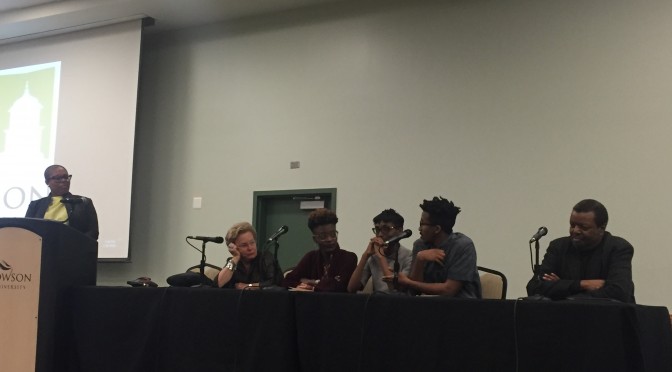
Panelists tackle college activism following film screening
By: Carley Milligan, Editor-in-Chief
#OccupyTowson student activists and former Black Student Union leadership encouraged students to speak out against racist language and abuse of privilege Wednesday, following a screening of the documentary “Agents of Change” in the West Village Commons Ballrooms.
Students John Gillespie, Bilphena Yahwon and Breya Johnson from the #OccupyTowson movement sat on a panel with “Agents of Change” co-director Abby Ginzberg and Arthur Woodard, Towson’s first BSU president. They all encouraged the audience to continue to “call out” friends, family, professors and peers who use racist language, take advantage of their own privilege or facilitate oppression.
“That’s the only way, to keep calling it out,” Johnson said. “You have to try to fix people’s language.”
The documentary focused on two student protests during the Civil Rights Movement, one at San Francisco State in 1968, and the other at Cornell University in 1969. Both included elements similar to the #OccupyTowson sit-in that took place last November, such as a list of demands and an occupation of a university building.
“My initial reactions [to the film] were just how much was still the same,” Associate Director for Student Diversity and Development at the Center for Student Diversity Anee Korme, who helped organize the screening, said. “While we feel very progressive, and we are in many ways, just a lot of things remain the same.”
Woodard noted that the demands of all three protests were comparable to the list of demands he and other students in the BSU presented to Towson’s former president James Fisher during a protest in 1970.
“We were asking for many of the same things that you saw in the film,” he said. “We were asking for a program to be set up, curriculum, we were asking for teachers. We were also asking that the students who were coming in and staying on campus were treated fairly.”
Following the 1970 sit-in, the students received most of what they asked for from the University, but were perceived by some on campus to be “troublemakers,” Woodard said.
“We realized we had to teach the school what we needed,” Woodard said.
During the discussion, Gillespie, Johnson and Yahwon spoke about their reasons for organizing the #OccupyTowson movement, citing the presence of the White Student Union on campus in 2012, inspiration from the student protests at the University of Missouri, personal experiences with racial slurs and microaggressions on campus, a lack of tenured black professors and black curriculum, and more.
Johnson and Yahwon also spoke about the potential academic or social repercussions of speaking out publicly as an activist and how they sometimes have to work to justify their activism while also dealing with the oppression they are already fighting against.
“As an activist you sometimes spend more time trying to prove what you are doing matters than getting things done,” Johnson said.

